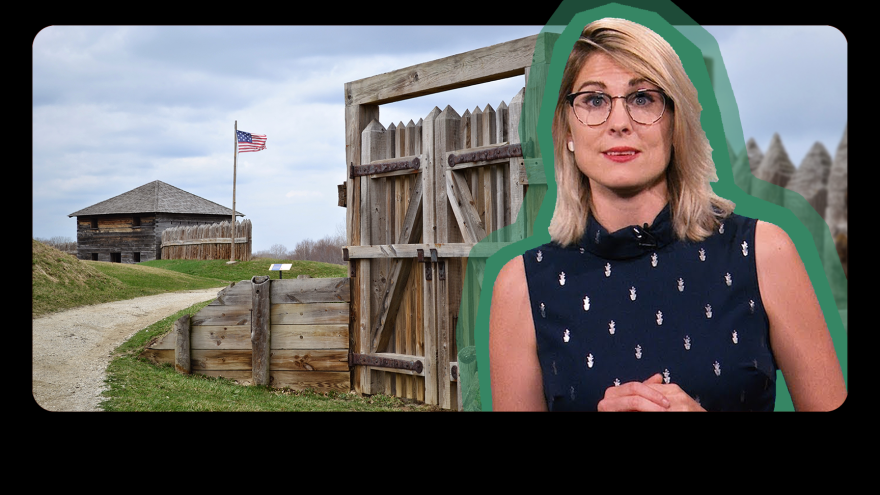Fort Meigs played a huge roll in the War of 1812, and it's right here in Ohio!
Class Discussion Questions:
1) Explain the importance of Fort Meigs in the War of 1812.
Read the Script:
Ohio is home to some brave veterans and it has been ever since our country's earliest days. During the War of 1812, soldiers at Fort Meigs in Perrysburg, Ohio, helped to lead the U.S. to victory over the British.
Today, a replication of the fort allows visitors a glimpse into the days when this peaceful town south of Toledo was a war zone. The original fort was built overlooking the Maumee River in 1813. General William Henry Harrison, who would later be the ninth president of the United States, ordered the fort to be built to defend the area.
See, America got caught in a war between France and Great Britain. In 1812, President James Madison called on Congress to declare war on Great Britain for multiple reasons. One reason was that the British seemed to be supporting Native Americans attacking Americans. Another reason for the war was impressment by the British. Impressment is when one country forces citizens of another to fight in their army. And in this case, the British forced Americans to fight their battles.
Madison saw the impressment as the British trying to stop the expansion of the U.S.. The war was being fought across the nation, from Washington D.C. to New Orleans. But in Ohio, soldiers were preparing at Fort Meigs. After three difficult winter months of building, the finished structure stood as the largest wood-walled fort in North America, and it was put to test right away.
In May, 1813, the British opened fire on the fort and kept firing for five days straight. The Ohio soldiers held on in time for soldiers from Kentucky to come as reinforcements. A group of these men, led by Colonel William Dudley, was able to disarm the British cannons and days later, the British, along with the Native Americans, gave up the fight. At the end of the siege, about 600 American soldiers had been killed.
The next siege on Fort Meigs took place in July, 1813. This time, the British and Native Americans tried a different approach. They put on a fake battle outside of the fort, hoping to trick the Americans into coming out. But their trap didn't work. The Americans stayed put, and eventually a thunderstorm caused the enemies to retreat.
These two victories were a turning point in the war. It was followed by more American victories in the Great Lakes region. Still, many more battles had to take place, including the one that inspired The Star Spangled Banner to be written, before the war came to an end, in December 1814, with the signing of the Treaty of Ghent.
Find Out More
Website: Fort Meigs 1813, Explore the Past | Try the word search & web scavenger hunt




